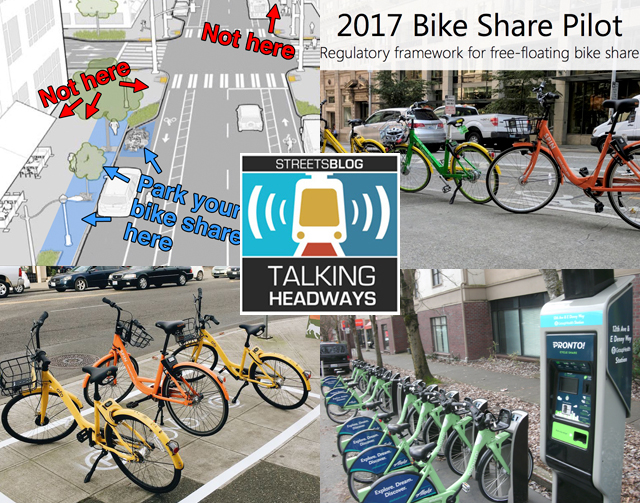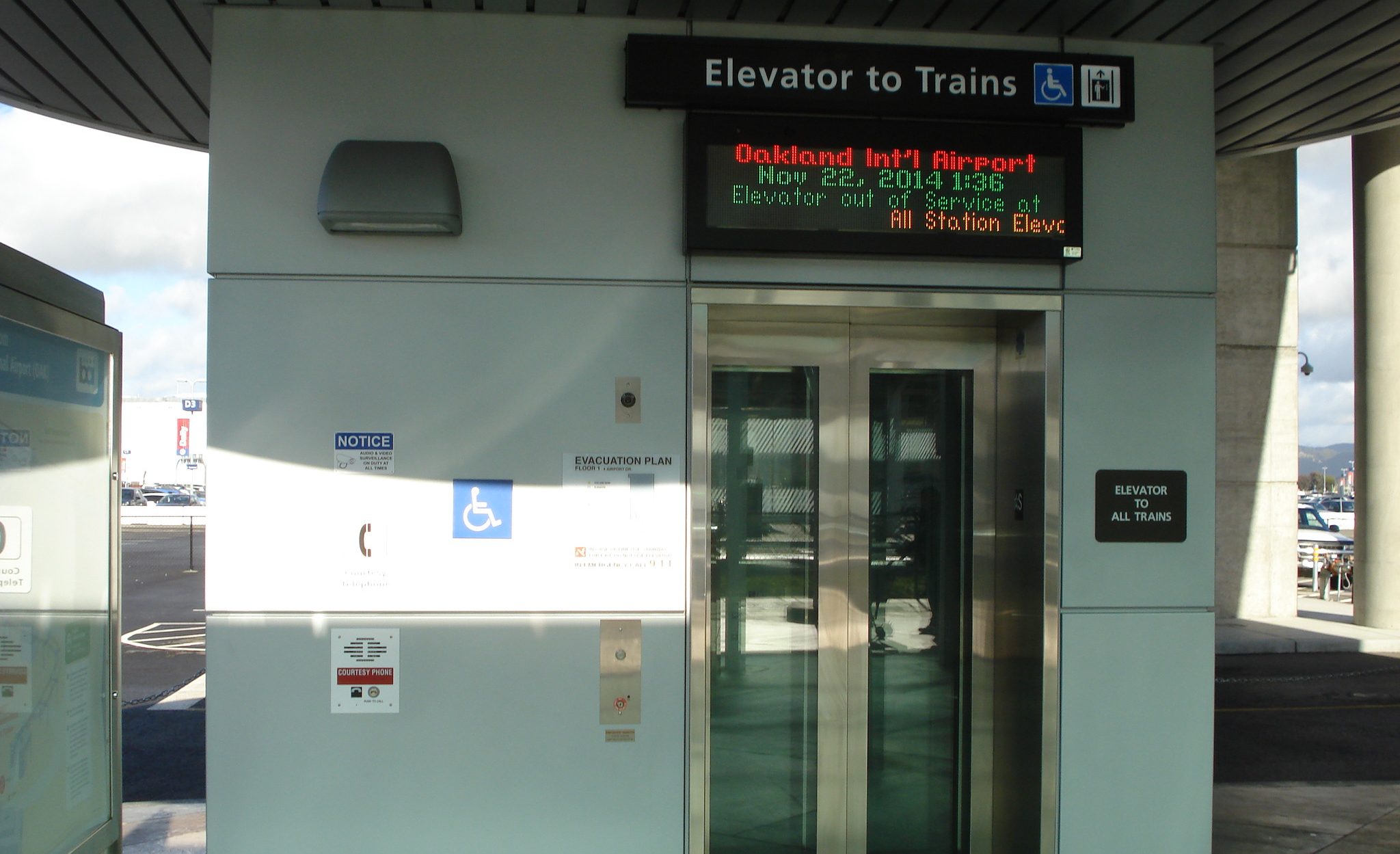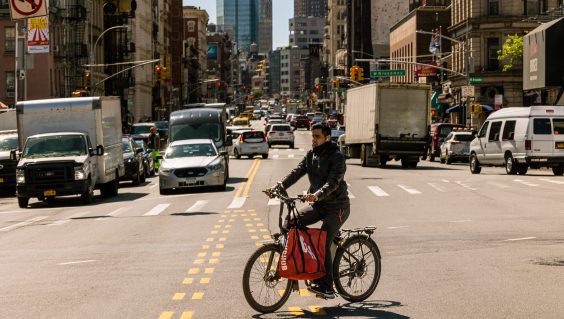This week, we’re joined by SPIN Global Head of Government Partnerships Kyle Rowe to talk about his work with Seattle DOT transitioning from docked to dockless bike share, the impact of ride hailing on micromobility adoption, and the future of his industry.
For those of you who prefer to read, an edited transcript is below the player. For the full transcript (with some typos!), click here.
Jeff Wood: So I want to go back in time a little bit to your time at Seattle DOT and I'm curious, you know, Seattle saw a, a bike share program, you know, disappear, but then come back with a different approach. What were some of the lessons that you took from that process as the metaphorical shepherd? So, sorry, that's a deep question. Huh?
Kyle Rowe: It's a deep question. So some wounds are still healing from that era, but no worries. We had Pronto, our station-based municipal bike share system, which was very much like other systems that folks know about, you know, a Citi Bike, Capital Bikeshare, Divi, operated by Motivate. It was very similar to those other systems, similar technology, but slightly different, which was annoying because you couldn’t actually work with other cities to interchange stations or bikes. (I wasn’t part of the procurement process originally, I was working on getting bike lanes and taking away parking spots at that time.) But when we realized that the system wasn't going to provide a path towards being financially sustainable, or at least financially sustainable in the way as originally envisioned, we actually tried to replace the entire system with an e-bike fleet.
Seattle put out an RFP that selected a company to operate a completely new network of stations and bikes — still under the municipal framework of being city owned and subsidized. So all of the stations would recharge the bikes and every single bike would be an e-bike, which for the market in Seattle, it was really appealing because it's a quite hilly city. The public perception of bike share overall was just in such a poor spot in advance of a re-election so there was just no political capital to be spent on bike share. And because of that, as well as some original design decisions about the system, such as how few stations there were and where they were, it really decreased the cases of a user trying the system.
But the reason for that was to basically bring in more funding partners, more sponsors, and to show that this system could be in more neighborhoods and they would be kind of infill stations because of a few things like that lead to the low ridership, which created lower political support for it. We had to basically put it in our warehouse. All the funding for this system was basically taken away and we found ourselves entering the summer of 2017 with no bike share.
So lessons learned from that: the density and the availability of the service is really key to create demand and to really get people to find that as an alternative to whatever their transportation choices are today. Also, managing and really being really hyper-aware of the political climate and perception of micromobility and how that could impact decisions is key, whether you're in a public transit agency, DOT, private company, as a member of the public and advocacy organizations. It's also important to really make sure that our leaders, our electeds know that this is a priority for us.
We are working to accomplish goals that the city has stated they're trying to reach, and always showing that we're working to improve it. So that was the huge, huge lesson learned.
Jeff Wood: And then you went to a dockless system. What got you to start thinking about that as a way to, to move forward?
Kyle Rowe: So when we got the word that funding was going to be cut. It was a classic news drop: like Friday at 5 p.m. from the mayor's office. It quickly turned into like, "OK, well, how do we decommission?" And then it really sets in, you know, people start to realize like, "Oh wow, we are entering the summer, the main riding season for this market, when bike demand kind of goes up and takes some of the load off of transit and other modes?"
And Seattle is supposed to be the progressive bubble, right? Where supposed to be leading on these sort of things. At the same time that this was happening, there was news coming out of China about a new business model for a bike share, OFO Mobike, actually a company called Blue Go-Go, which basically fizzled by the time we were getting anywhere near a permit, these companies were making a lot of headlines, and everyone's seen the pictures of the piles to the dockless bikes, but also hearing the massive ridership numbers and huge potential behind the scenes kind of newer approach.
The director at DOT at the time was Scott Kubly. I had to work closely with him on decommissioning Pronto and managing that. But then we started to really think about how this could be done differently? Could this be done without public funds? Also, what's the opportunity here to maybe get the things that I think the average DOT would like to have control over with other mobility services into a permit and have a mutual agreement that these are good for the vendor and the city and get companies to agree to it. And that included things like data sharing at the trip level in a format that was safe for the user's privacy, but as safe as we could be based off of the information we had.
So it was this kind of idea kind of floating in our heads that we could, you know, almost with a blank sheet of paper, just start putting down, like, what would we do with our ideal permit to bring in this technology, but manage it? And that's how we did it. I mean, literally opened up a blank word doc. And were like, "All right. Operations: what do I want from every company to follow operating-wise, like, how quickly do we want to respond to issues? What do I expect them to do to train their staff on deployment etiquette and how to manage the right of way, etc." Maybe we would shop it around the department and say, “Hey, what do you think about this? How should we define the parking requirements? How do we define the parking requirements on a block that doesn't have a sidewalk (which Seattle has a lot of)?"
So we basically put it all out there, shopped it around to the folks that mostly had no idea of what it is we are doing. And were like, “What are you doing again? You are replacing Pronto, but you’re not paying for it. How is that going to happen? This doesn’t make any sense.”
But thankfully, I had previous worked in the long range planning team at SDOT, the folks who kind of drove the policy and planning functions of the department. Particularly, my work was supporting the 2014 Bike Master Plan. And then I moved into the engineering group. I was a planner by trade, but kind of learned engineering enough to be dangerous. And you know, I adopted this plan-gineer role and thought about what is the tip of the spear on a bunch of bike lanes and, and also managed the bike parking program and kept our annual bike map up and running.





